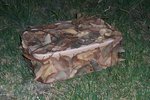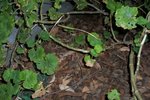Difference between revisions of "Camouflage"
m |
(Added images) |
||
| (2 intermediate revisions by one other user not shown) | |||
| Line 1: | Line 1: | ||
[[Camouflage]] is the art of making a [[cache container]] look like either invisible or like something else. | [[Camouflage]] is the art of making a [[cache container]] look like either invisible or like something else. | ||
At it's simplest this might mean painting the container. | At it's simplest this might mean painting the container. | ||
| − | As the containers are frequently plastic and outside the challenge is getting the paint to stick. | + | As the containers are frequently plastic and outside in the weather the challenge is getting the paint to stick. |
One method that helps is sanding the plastic and another is using oil based paint such as chalkboard board, which is superb if you want a 100% matt black. | One method that helps is sanding the plastic and another is using oil based paint such as chalkboard board, which is superb if you want a 100% matt black. | ||
| Line 10: | Line 10: | ||
If the cache is to be in gravel then gravel can be glued over the container, similiarly if the cache is in an old log or a tree hollow then matching bark from the tree can be glued on. | If the cache is to be in gravel then gravel can be glued over the container, similiarly if the cache is in an old log or a tree hollow then matching bark from the tree can be glued on. | ||
| − | Some of more ingenious [[geocache]]s | + | |
| − | In this case the paint colour for the cache can be matched from a digital photograph of the | + | [[Image:Leaf_camo.jpg|thumb|150px|left|A camoflaged cache]] |
| + | |||
| + | [[Image:Leaf_camo_hidden.jpg|thumb|150px|right|The cache in position]] | ||
| + | |||
| + | Some of more ingenious [[geocache]]s are [[camouflage]]d to hide on man-made objects. | ||
| + | In this case the paint colour for the cache can be matched from a digital photograph of the object and the cache container itself hand made to look like something that should be there. | ||
Another concept is fabricating something like a fake fencepost, suitably hollowed out, and then put into place, complete with removeable but disguised cap. | Another concept is fabricating something like a fake fencepost, suitably hollowed out, and then put into place, complete with removeable but disguised cap. | ||
One thing to be wary of though, a green [[cache container]] might be fine in winter but by February tends not to blend into dead grass and weeds. | One thing to be wary of though, a green [[cache container]] might be fine in winter but by February tends not to blend into dead grass and weeds. | ||
Latest revision as of 23:44, 8 March 2006
Camouflage is the art of making a cache container look like either invisible or like something else. At it's simplest this might mean painting the container. As the containers are frequently plastic and outside in the weather the challenge is getting the paint to stick.
One method that helps is sanding the plastic and another is using oil based paint such as chalkboard board, which is superb if you want a 100% matt black.
Another method is to have the cache in a fake object such as a fake rock. These can be purchased or made. Making can involve modyfing a real rock to have a hollow compartment or using bits of real rock ground up to coat a container with a suitable adhesive. If the cache is to be in gravel then gravel can be glued over the container, similiarly if the cache is in an old log or a tree hollow then matching bark from the tree can be glued on.
Some of more ingenious geocaches are camouflaged to hide on man-made objects. In this case the paint colour for the cache can be matched from a digital photograph of the object and the cache container itself hand made to look like something that should be there.
Another concept is fabricating something like a fake fencepost, suitably hollowed out, and then put into place, complete with removeable but disguised cap.
One thing to be wary of though, a green cache container might be fine in winter but by February tends not to blend into dead grass and weeds.

